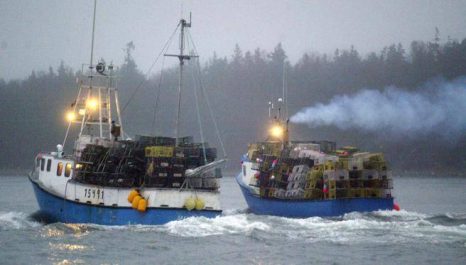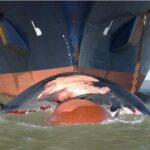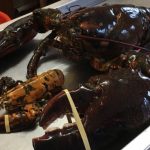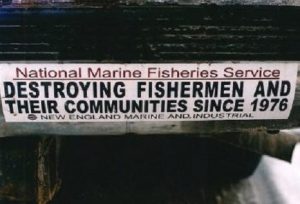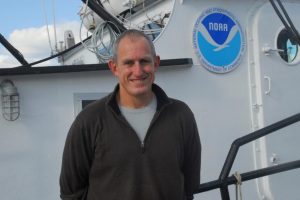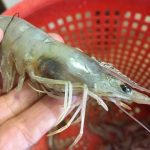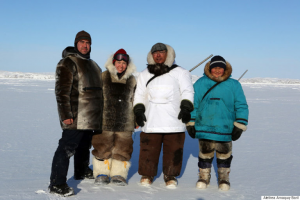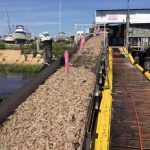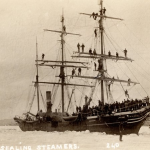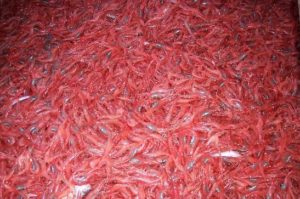Daily Archives: November 5, 2016
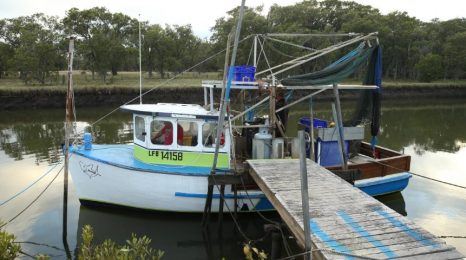
Williamtown toxic truth: Hunter River fishing bans lifted
The Hunter’s prawn trawlers went back to work this week for the first time since agreeing to an indefinite ban on working the Hunter River in November last year. The ban – dubbed a gentleman’s agreement – came as a result of contamination from the Williamtown RAAF Base. It followed state government bans on fishing in Fullerton Cove and the upper Tilligerry Creek, and was seen as necessary to protect the region’s seafood reputation. Then in October this year, to the surprise of a lot of fishers, the bans were lifted. The Department of Primary Industries issued a statement saying the public could “be confident that seafood for sale is safe to eat”, and the Newcastle Fishing Cooperative began accepting local produce again. “We were shocked,” Hewitt says on his trawler, named Junior. “We turned up to that meeting thinking, you know, they were going tell us whether or not they would buy our boats off us. “Then the first thing the DPI guy said was ‘full opening of the river from this date’. “Everyone just stayed quiet. It was unreal. Even all the crazy fishermen who I thought would abuse them just said nothing.” Nice photo gallery, Read the rest here 19:50
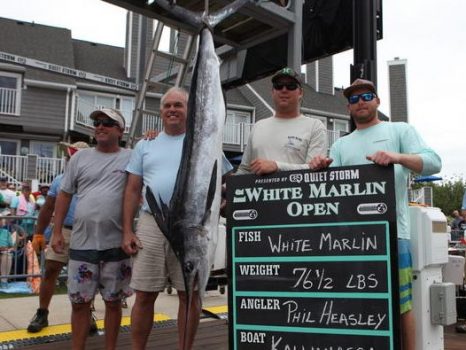
Federal Judge asked to decide outcome of White Marlin Open after organizers say $2.8 million winner failed lie-detector test
Fishermen are known to tell tales. But a federal judge in Baltimore is being asked to determine the outcome of the White Marlin Open after organizers in Ocean City said the man who was initially declared the winner of a $2.8 million first prize twice failed a lie-detector test. Billed as “the world’s largest billfish tournament,” the tournament spans a week in August and takes place offshore from Ocean City. There’s no oversight on the open water, so those who win $50,000 or more are required by contest rules to take a polygraph test. “There’s no policeman out in the ocean,” said Jim Motsko, president of the tournament. To keep it from being a “free-for-all, we learned real quick, you got to have rules and stick with them.” The big winner of this year’s tournament, Philip G. Heasley of Naples, Fla., caught the winning 76.5-pound white marlin but later failed two polygraph tests, according to the court filings. Heasley was not awarded the prize money, Read the story here 14:37
Decision Will Allow Disposal Of Dredged Materials In Long Island Sound
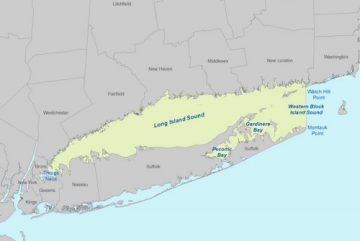 Federal environmental officials Friday dismissed protests from New York and issued a final ruling that will allow operation of an open-water site in eastern Long Island Sound for disposing of dredged materials from harbors and ports. The EPA decision drew applause from Connecticut’s congressional delegation and state officials who argued that halting dredge disposal in the eastern Sound would be a damaging economic blow for shoreline communities in this state. In its ruling, the EPA shifted the location of the new open water disposal site to place it entirely within Connecticut waters. New York officials and environmentalists fear the open water disposal of muck dredged primarily from Connecticut harbors could pollute the waters of the Sound and harm commercial and recreational fishing. Read the story here 12:34
Federal environmental officials Friday dismissed protests from New York and issued a final ruling that will allow operation of an open-water site in eastern Long Island Sound for disposing of dredged materials from harbors and ports. The EPA decision drew applause from Connecticut’s congressional delegation and state officials who argued that halting dredge disposal in the eastern Sound would be a damaging economic blow for shoreline communities in this state. In its ruling, the EPA shifted the location of the new open water disposal site to place it entirely within Connecticut waters. New York officials and environmentalists fear the open water disposal of muck dredged primarily from Connecticut harbors could pollute the waters of the Sound and harm commercial and recreational fishing. Read the story here 12:34
Ecosexuals: For Those Times When Hugging a Tree is Not Enough
 Ecosexuals Believe Having Sex with the Earth Could Save It – If you happen to find yourself in Sydney this week, you have the unique opportunity to have sex with the earth. You just need to stop by the “ecosexual bathhouse,” which is currently part of the Syndey LiveWorks Festival of experimental art. The bathhouse is an interactive installation created by artists Loren Kronemyer and Ian Sinclair of Pony Express, who described the work to me as a “no-holds-barred extravaganza meant to dissolve the barriers between species as we descend into oblivion” as the result of our global environmental crisis. But they also see their piece as a part of a much larger ecosexual movement, which they say is gathering momentum around the world. Ecosexuality is a term with wide-ranging definitions, which vary depending on who you ask. Amanda Morgan, a faculty member at the UNLV School of Community Health Sciences who is involved in the ecosexual movement, says that ecosexuality could be measured in a sense not unlike the Kinsey Scale: On one end, it encompasses people who try to use sustainable sex products, or who enjoy skinny dipping and naked hiking. On the other are “people who roll around in the dirt having an orgasm covered in potting soil,” she said. “There are people who f ck trees, or masturbate under a waterfall.” Read the post, leave a comment here 10:29
Ecosexuals Believe Having Sex with the Earth Could Save It – If you happen to find yourself in Sydney this week, you have the unique opportunity to have sex with the earth. You just need to stop by the “ecosexual bathhouse,” which is currently part of the Syndey LiveWorks Festival of experimental art. The bathhouse is an interactive installation created by artists Loren Kronemyer and Ian Sinclair of Pony Express, who described the work to me as a “no-holds-barred extravaganza meant to dissolve the barriers between species as we descend into oblivion” as the result of our global environmental crisis. But they also see their piece as a part of a much larger ecosexual movement, which they say is gathering momentum around the world. Ecosexuality is a term with wide-ranging definitions, which vary depending on who you ask. Amanda Morgan, a faculty member at the UNLV School of Community Health Sciences who is involved in the ecosexual movement, says that ecosexuality could be measured in a sense not unlike the Kinsey Scale: On one end, it encompasses people who try to use sustainable sex products, or who enjoy skinny dipping and naked hiking. On the other are “people who roll around in the dirt having an orgasm covered in potting soil,” she said. “There are people who f ck trees, or masturbate under a waterfall.” Read the post, leave a comment here 10:29
Record high prices expected for red king crab fleet
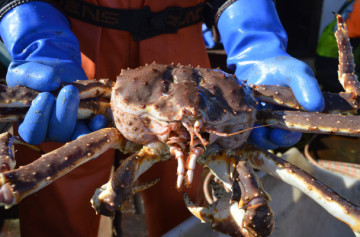 The Bristol Bay red king crab season is moving at a fast pace, with most of the quota already harvested. While state regulators slashed quotas, a crab industry official says fishermen are seeing plenty of all species, and are expecting record high prices. On Tuesday, the fleet had landed 7.5 million pounds, for 89 percent of the red king crab quota, according to the Alaska Department of Fish and Game in Unalaska. Only 18 boats were still registered, down from the peak of 62 vessels. The season opened on Oct. 15. While the red king crab prices are expected at record highs, that’s the one bright spot for the major crab fisheries in the Bering Sea. Tanner crab has been canceled because of conservation concerns. The snow crab quota was nearly cut in half, compared to last year. Now, more fishermen than ever are expected to try to fill their pots with another species, Pacific cod, according to Krista Milani, a fisheries biologist with the National Marine Fisheries Service, in Unalaska. While she’ll know more next week, she reports a “very unusual” amount of fishing boats planning to go directly into Pacific cod from red king crab. Read the story here 09:57
The Bristol Bay red king crab season is moving at a fast pace, with most of the quota already harvested. While state regulators slashed quotas, a crab industry official says fishermen are seeing plenty of all species, and are expecting record high prices. On Tuesday, the fleet had landed 7.5 million pounds, for 89 percent of the red king crab quota, according to the Alaska Department of Fish and Game in Unalaska. Only 18 boats were still registered, down from the peak of 62 vessels. The season opened on Oct. 15. While the red king crab prices are expected at record highs, that’s the one bright spot for the major crab fisheries in the Bering Sea. Tanner crab has been canceled because of conservation concerns. The snow crab quota was nearly cut in half, compared to last year. Now, more fishermen than ever are expected to try to fill their pots with another species, Pacific cod, according to Krista Milani, a fisheries biologist with the National Marine Fisheries Service, in Unalaska. While she’ll know more next week, she reports a “very unusual” amount of fishing boats planning to go directly into Pacific cod from red king crab. Read the story here 09:57
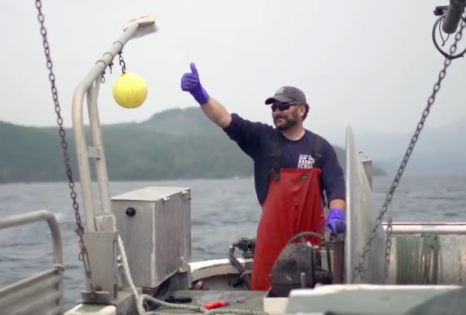
‘Largest’ recorded chum salmon run: 2 million fish overload nets, burden boats
Record numbers of chum salmon — two million fish — returned to B.C’s West Coast this year, bringing good news for fishermen fatigued by word of record lows of Fraser River sockeye. That news got even better with the Johnstone Strait haul hitting 1.3 million fish. “Fraser River chum salmon return is estimated to be two million, the largest return on record,” said Lara Sloan of Fisheries and Oceans Canada in an email to CBC Friday. “Catches in Johnstone Strait were some of the strongest on record. There have also been very strong returns of chum to the Nanaimo River.” Gillnetter Shaun Strobel fishes the west coast of Vancouver Island, down the Johnstone Strait to Nanaimo. “Everybody was catching fish from the top of the straights up towards Alert Bay all the way down to Campbell River. We were catching fish everywhere,” said Strobel, who described loads of fish weighing down boats and threatening to break or sink nets. Read the story here 09:29
Prices for commercial halibut shares reach jaw-dropping level
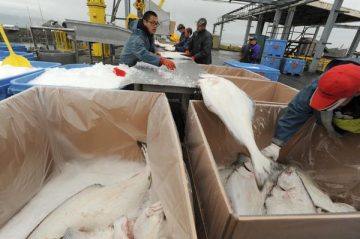 As Alaska’s iconic halibut fishery wraps up this week, stakeholders are holding their breath to learn if the catch limit might ratchet up slightly once again in 2017. Meanwhile, prices for hard-to-get shares of the halibut catch are jaw-dropping. The halibut fishery ends Monday for nearly 2,000 longliners who hold halibut IFQs (Individual Fishing Quotas). The Alaska fishery will produce a catch of more than 20 million pounds if the fleet reaches its limit. Last year, the halibut haul was worth nearly $110 million at the Alaska docks. For the first time in several decades, the coast-wide Pacific halibut harvest numbers increased this year by 2.3 percent to nearly 30 million pounds. Along with Alaska, the eight-month fishery includes the Pacific Coast states and British Columbia. Read the story here 09:07
As Alaska’s iconic halibut fishery wraps up this week, stakeholders are holding their breath to learn if the catch limit might ratchet up slightly once again in 2017. Meanwhile, prices for hard-to-get shares of the halibut catch are jaw-dropping. The halibut fishery ends Monday for nearly 2,000 longliners who hold halibut IFQs (Individual Fishing Quotas). The Alaska fishery will produce a catch of more than 20 million pounds if the fleet reaches its limit. Last year, the halibut haul was worth nearly $110 million at the Alaska docks. For the first time in several decades, the coast-wide Pacific halibut harvest numbers increased this year by 2.3 percent to nearly 30 million pounds. Along with Alaska, the eight-month fishery includes the Pacific Coast states and British Columbia. Read the story here 09:07






